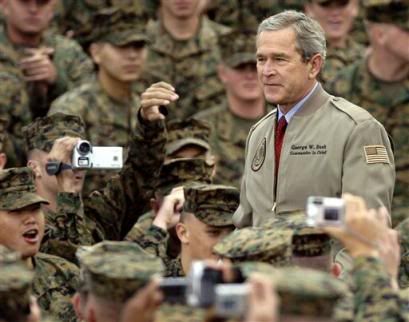 Yet another great piece by Glenn Greenwald on the creep of the concept of "commander in chief" into the domestic sphere.
Yet another great piece by Glenn Greenwald on the creep of the concept of "commander in chief" into the domestic sphere.What I have always thought most disturbing about the telecom immunity business is the apparent seamlessness between the telecoms and the government - the telecom corporations became less an agent of the government and more of an arm of the government. Or, perhaps more precisely, the telecoms and the government took on a kind of symbiotic relationship to each other. Like oligarchical lichen:
What all of this is really about -- the reason why political elites like Nancy Soderberg are so eager to defend it -- is because they really do believe that lawbreaking isn't wrong, that it doesn't deserve punishment, when engaged in by them rather than by commoners. People who defend telecom immunity or who say that it's not a big deal are, by logical necessity, adopting this view: "Our highest political officials and largest corporations shouldn't face consequences when they break our laws as long as they claim it was for our own good." That's the destructive premise that lies at the heart of this deeply corrupt measure, the reason it matters so much. Just like the pardon of Nixon, the protection of Iran-contra criminals, and the commutation of Lewis Libby's sentence, this bill is yet another step in cementing a two-tiered system of justice in America where our highest political officials and connected elite can break our laws with impunity.The justification for all of this really centers upon a notion of the president as a "commander in chief" not only of the armed forces, but also as "commander in chief" of all of us. Where unilateral "orders" once only applied to the military, we too are now subject to the president's unilateral whim. And the pressure for lawlessness at the behest of "national security" is most high when, as in the telecom immunity debate, the interests of a kleptocratic oligarchy are at stake.
How is this not like a banana republic?




3 comments:
>How is this not like a banana republic?
It's got less chinos. Way less chinos.
As I read the article, Greenwald's point was simply that supporters of the FISA bill are kowtowing to government officials and the corporations (damn the man) by arguing that these entities "shouldn't face consequences when they break our laws as long as they claim it was for our own good."
Yet, Greenwald notes that the bill will likely be passed by a clear bipartisan majority in Congress.
If one assumes his concern is valid, it follows that the bill is as much a function of Congressional impotence as the commander-in-chief creep.
In theory, Congress could stand up to an unpopular President and fight the 'unilateral orders' without fear of political retribution. This is not to say it would be easy. But it could be done were Congress interested.
I suppose causation is always tricky. It just seems to me that c-i-c creep might be spurious.
I agree that much of this is due to Congressional acquiescence to the the Executive (and I'm bipartisanly pissed about it, too). Oh yeah, all the Telecom money floating around Congress doesn't help matters either.
What I mean by "C-I-C Creep" is that our current political discourse often conflates "commander in chief of the military" with "commander in chief of the citizenry." This conflation then provides a kind of cover for what in my opinion have been blatant violations of federal statutes by the president and certain telecom companies (Certain companies, because Qwest did not participate in the surveillance program because its attorneys deemed the surveillance program illegal).
Underlying most of the beltway discourse on this matter is "if the president 'orders' it, then it must be followed." As if POTUS is a monarch.
This is one issue that to me very much cuts above party. A lawless executive branch is a grave danger whether the president is Democratic or Republican.
Post a Comment